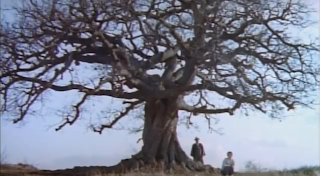What struck
me most about Sopyonje is its beautiful representation of the Korean
countryside. The film’s use of long shots immortalizes landscapes of mountains,
rivers and fields and people are often situated to the side and appear small.
This creates an image in which man, who appears small, helpless and
insignificant in relation to the landscapes surrounding him, is no match for the
grandeur of nature and Korea’s natural beauty.
Nature, as represented by Im
Kwon-Taek’s excessive use of long shots, symbolizes the Korean people’s
yearning for the traditional in a time of post colonialism and the spread of American
mass culture into small countryside villages. Chungmoo Choi, in “The Politics
of Gender, Aestheticism, and Cultural Nationalism in Sopyonje and The
Genealogy”, also mentions that Sopyonje’s representation of nature
acts as one of the nostalgic devices the film uses in order to show everyday events
from the recent past which serve to “confer validity on the sense of
preindustrial community”, meaning that they offer a shared space for Koreans to
collectively project their nostalgia towards the traditional precolonial Korea
(115). The people’s han, or the unexpressed feelings of oppression and
sorrow resulting from Korea’s colonial past, is also placed in this collective
sphere of nostalgia that is partly formed by the Korean countryside landscape. In
Sopyonje nature, therefore, has a paradoxical dual symbolic
representation of an empowered being (where beauty holds power) that stands far
above any insignificant human being (as positioned in specific frames of the
film) and, also, of a hopeless and helpless being whose traditional roots (pansori
and natural landscapes) are slowly disappearing and being replaced or filled by
modern technology, music and industrialization. The first symbolic
representation of nature instills in the viewer with some hope and pride for preserving
traditional Korean cultural symbols; the second depiction of nature stirs up
feelings of nostalgia for the precolonial Korea and the beauty and simplicity
of its countryside. Im’s use of long shots to frame natural landscapes created
for me a mixed feeling of hope and nostalgia which stood out from the sorrowful
and devastating life led by Songhwa.


No comments:
Post a Comment